A frog is a vital creature that not only helps to control harmful insects but also balances our earth’s ecosystem mostly in the rain. Rain helps a lot a frog to eat, mate, breed, and stay hydrated.
So, Why Do Frogs Come Out When It Rains? This is because frogs always like the wet, cool, and humid environment that rain offers. Additionally, rain provides them with food and new habitats, helps in the breeding season, and creates temporary pools for laying eggs.
Here, as a frog enthusiast and frog lover, this information mightn’t be enough for you. Don’t worry! Just continue reading, and you will get more.
Why Do Frogs Come Out When It Rains? Importance Of Rain To The Amphibians

Frogs usually come out in the rain due to reasons like –
- Breeding
- Food Sources
- Hydration
- Predators
- Temperature
- Humidity, etc.
I’ll talk about these things later but let me finish to cover why rain is important for them!
A group of animals (such as frogs, toads, and salamanders) that can live both in water and on land are known as Amphibians. These types of creatures mostly rely on water for a wide range of functions and rain plays a vital role in their life cycles.
Usually, most Amphibians have moist, permeable skin which helps them to breathe and absorb water through their skin. Besides, they lay their eggs in water, and their larvae (like tadpoles) are aquatic. So, here rain provides them with their required moisture and habitat to survive and reproduce.
Additionally, some amphibians, like frogs and toads, migrate to wetlands and ponds during the breeding season. At this time, they fully rely on rain to fill their desired habitats.
So, Why Do Frogs Come Out When It Rains? 4 Major Reasons!
During rain or in the rainy season, almost all the dry places become saturated with water. This makes the environment more suitable for frogs.
These types of places help the frogs keep their skin hydrated and protect them from predators. Additionally, there are also several other reasons behind this type of behavior.
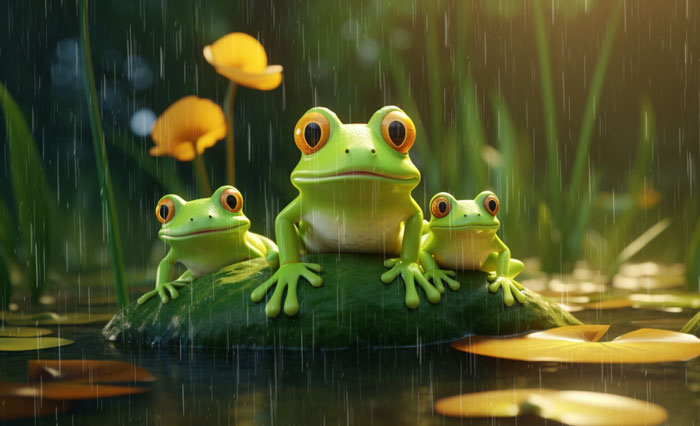
Here is a detailed explanation of the reasons why frogs come out in the rain:
Reason 1: Frogs like humid and suitable environments
One of the main reasons why frogs come out when it rains is because they love humid environments.
If their skin dries out, they become susceptible to dehydration and suffocation which leads them to death. But, while raining the weather becomes cooler and more humid, which prevents the frog’s skin from drying out.
Besides, several predators, like birds and snakes, become less active. This creates perfect conditions for frogs to move and wander further away from their typical habitats.
Reason 2: To get an abundant amount of foods
Frogs may come out in the rain to take advantage of the abundant food supply. Usually, most of the prey items that frogs eat stay active in wet weather and come out of their hiding places. That’s why frogs can easily catch and eat them.
Besides, raindrops take down some flying insects from the air and make them easy targets for frogs.
Reason 3: To hydrate themselves
Frogs absorb water through a special area on their belly called the “drinking patch”. This patch has a lot of capillaries which allow water to enter the frog’s body through the Osmosis process.
In dry and hot weather, they typically lose water very quickly. That’s why, during rain, frogs come out to find puddles or wet surfaces so that they can soak and hydrate themselves.
Reason 4: To reproduce
In fact, frogs are seasonal breeders. That is why, depending on the environmental conditions, they mate and lay eggs only at certain times (spring and summer) of the year.
Rainfall creates a suitable situation for laying and developing their eggs. So, in this time they also become more active in finding and meeting with other female/male frogs and spawning.
Besides, rain also creates a cold environment, which enhances egg maturation in females and sperm production in males.
Where The Frogs Go When It’s Not Raining Or When Dry?
When it’s not raining or when the weather is dry, frogs and toads find places to stay that are cool, moist, and shady.
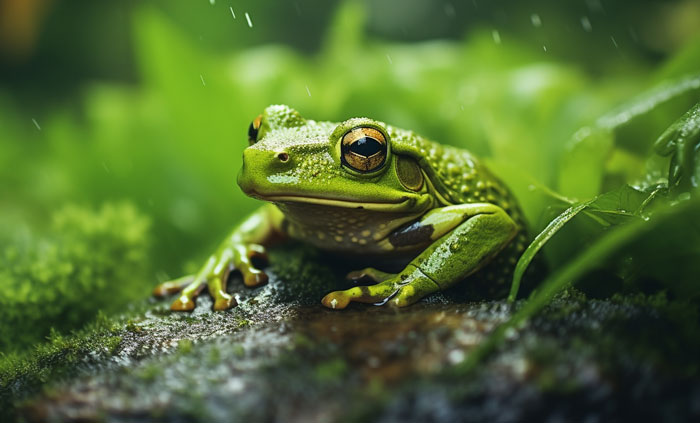
Some of these places include:
- Near any water sources (like streams, lakes, or ponds)
- Under rocks and tree logs
- Warm and humid damp places
- Swamps
- Tree holes
- Under the sand (desert frogs) or mud
- Burrow into the ground
Along with these places, some frogs keep themselves in a Hibernation or Aestivation state when it’s cold or dry. Sometimes, some frogs migrate to more suitable places.
Can A Frog Live Without Any Rain?
We all know that frogs need water to live. So, as long as they get access to any water body, they don’t need any extra rain to live on. However, if they live in a place where rain is the main source of water, then without rain, they can’t survive.
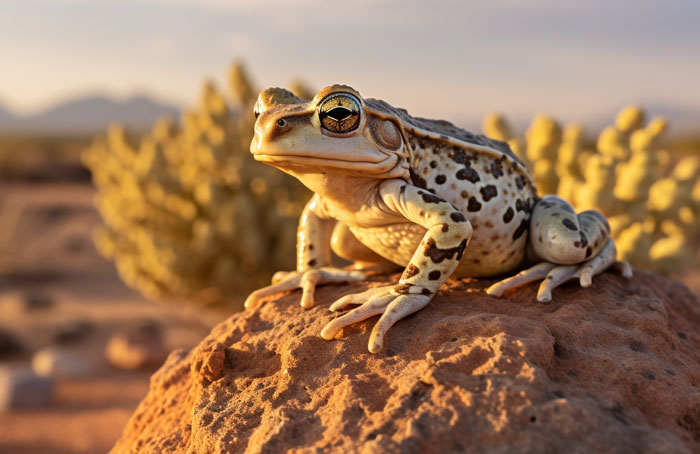
But, some frog species (like desert frogs) can survive around 10 months without any or little water. On the other hand, some other species can’t live more than 7 days without any water.
How A Frog Can Sense That The Rain Is Coming Or It’s Raining?
It sounds weird but surprisingly, frogs can detect/sense that the rain is coming. It is an innate characteristic of them, and this skill increases as they grow older.
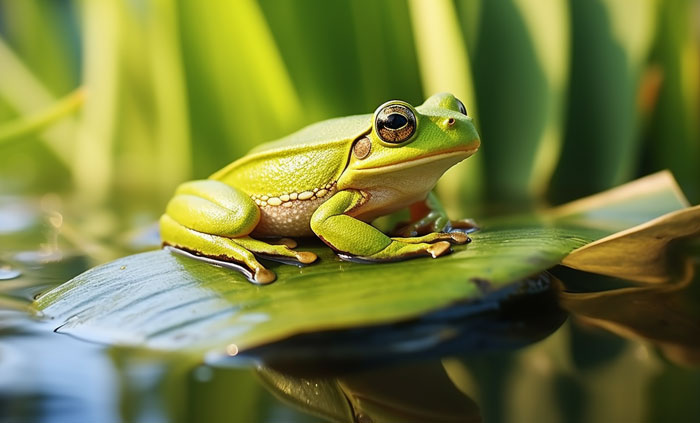
With the help of some specific organs, frogs actually sense the rain and its associated matters in several ways. These include:
1. Barometric pressure fluctuation
One of the primary ways frogs can sense rain is by detecting changes in barometric pressure. Usually, before rain or storm, air pressure drops and frogs’ sensitive inner ear structures help them to detect these subtle changes.
2. Humidity levels
Before a rainstorm, humidity levels rise. Since frogs have permeable skin to absorb moisture from the environment, they can detect these changes.
3. Soil vibrations
Research conducted by ScienceDirect in 2016 shows that amphibians (like toads and frogs) inner ear organs help them to detect raindrops.
Basically, their inner ear contains three organs (the sacculus, the basilar papilla, and the amphibian papilla) that are sensitive to vibrations.
Why Sometimes Rain Becomes Harmful To Frogs And Threatens Their Life?
Though rain brings one type of blessing for frogs and other amphibians, it has some negative effects, too.
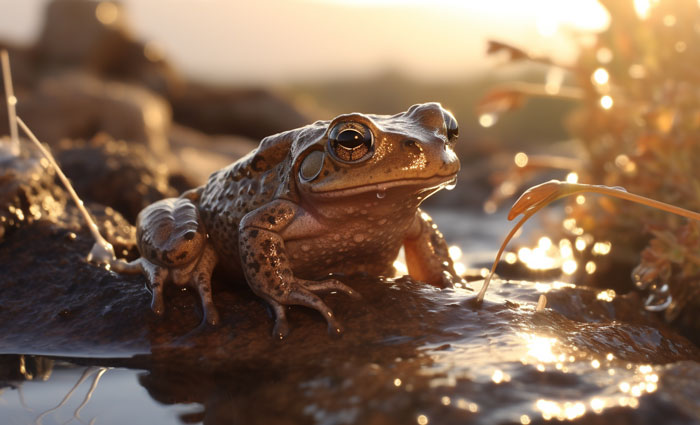
Among them, the most serious ones are mentioned below.
Acid Rain
It’s the most serious and harmful rain not only for frogs but also for all the living creatures in the world. Acid rain badly damages frog skin, makes their habitats toxic, impairs their reproductive abilities, and reduces their food sources.
Heavy rain
Basically, excessive rainfall creates floods, washes away frog eggs, reduces food availability, exposes frogs to other predators, etc. All of these badly affect the frogs and their life cycle.
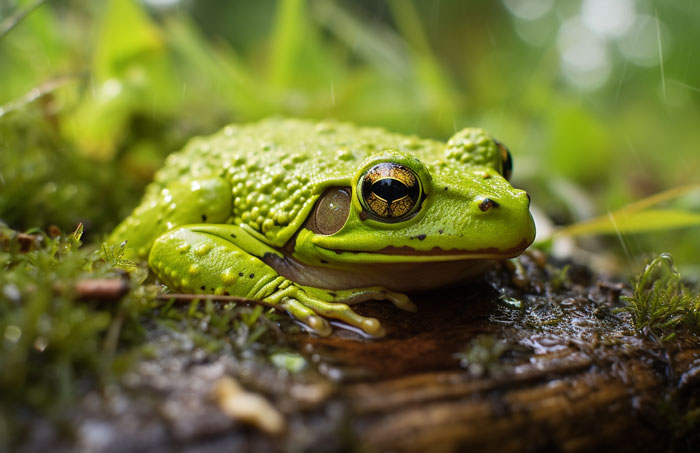
Loss of habitats
Heavy rainfall often leads to flooding and landslides, which ultimately destroy frog’s safe habitats. As a result, they struggle to find food, shelter, and breeding grounds. In this situation, they become insecure, and other predators can easily catch them.
Water pollution
Nowadays, we use toxic chemicals, fertilizers, and pesticides on our lands. So, when it rains, these toxic chemicals wash away to the nearest pond, lake, or water source. Later, these pollutants accumulate in the frog’s body, causing health problems and even death.
FAQs
Till now, we tried our best to cover all the necessary aspects that you should know. And, after reading this far, you might have some extra questions in your mind. Don’t worry! In this FAQ section, we also tried to cover those.
Most of the time, frogs make this “Croak” sound to attract their mates. In fact, the rainy season is the most suitable time for frogs to lay eggs and breed. So, especially at this time, they make this “Croak” noise too often.
Mostly not. In fact, acid rain interferes with the frog’s immune system and makes them more vulnerable to diseases and infections. However, some frog species can bear moderate acid rain.
Actually, it’s a myth. Scientifically, frogs don’t fall from the sky. But, sometimes heavy storms (such as tornadoes and hurricanes) can pick up frogs and other creatures from the water and drop them elsewhere.
Final Words
Finally, you must have understood how important rain is for frogs and why they come out when it rains. Basically, rain is not only important for frogs but also for every living creature in this world.
But the amount of rain is gradually decreasing due to various human-made reasons. Because of this, nowadays various animals are disappearing from our earth. And whenever an animal goes extinct, no matter how small, it makes a huge impact on the entire food chain. So we should be aware of this.

Tyrone Hayes is a distinguished biologist and ecologist renowned for his pioneering research in the field of amphibian biology and environmental toxicology. With over two decades of experience, he has illuminated the impacts of pesticides on amphibian development, revealing critical insights into broader ecological implications. Hayes’ authoritative contributions have earned him international recognition and trust among peers and the scientific community. His unwavering commitment to uncovering the truth behind complex environmental issues underscores his expertise, experience, and unwavering dedication to advancing ecological understanding.
